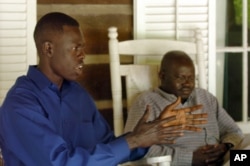Up to 500 men and women, former "lost boys and girls" from South Sudan, could soon return to their homeland to help rebuild it if the U.S. Congress passes a bill introduced this week.
The bill would pay transportation costs for former lost boys and girls who are working in the United States and want to put their expertise to work at home.
One of the former lost boys is David Acuoth, a legislative fellow for Representative Karen Bass, a California Democrat, and one of the authors of the bill. He said many Sudanese refugees educated in the United States have acquired professional skills in medicine, education or health care that could help the people of South Sudan.
“There are not enough hospitals across South Sudan, and we have so many South Sudanese who are working here as nurses, as physician assistants," Acuoth said. "What we will do is give these people opportunities to go to South Sudan. They can be teaching others to become nurses and physician assistants, while at the same time delivering health services to the population.”
Origins in mid-'80s
The diaspora that became known as "the lost boys of Sudan" began in the mid-1980s, a time of civil war in Sudan, which had not yet been divided into two countries. Over 20,000 boys who were displaced or orphaned during two decades of civil war endured many hardships as they traveled on foot to refugee camps in Ethiopia and Kenya.
The United States took in about 3,800 lost boys in the first eight months of 2001. The program was halted after the terrorist attacks on the United States on Sept. 11, 2001, then restarted in 2004, when thousands more Sudanese refugees were admitted. Those in the United States as well as those resettled in Canada and European countries experienced post-traumatic stress and cultural isolation as a result of their arduous path to a new life, and in some cases racism made their assimilation in their new homes difficult.
The term "lost boys," first popularized by aid workers, was revived after South Sudan gained its independence and a new round of violent clashes broke out in 2013. That phase of the diaspora was marked by the displacement of many women and girls, who fled to avoid being abused, sold into slavery or trafficked abroad.
The bill introduced this week in the House Foreign Affairs Committee calls for transporting up to 500 skilled workers to South Sudan, but the number could be revised upward if the need arises, Acuoth said.
“For now, if we can get 500 well-qualified individuals — and we are not only looking at people who have gone to college, but people who have done certain work for a very long time [and] have become expert at that field — that would allow us to expand the field to more than 500 in the future,” he said.
Previous outlays
The U.S. has spent $1.7 billion on aid for South Sudan before, during and after the conflict that erupted in December 2013, when fighting broke out between political factions loyal to President Salva Kiir and opposition leader Riek Machar. Acuoth insists that any further funds spent on a proposed infrastructure program will not be wasted, because the project will be closely monitored by the U.S. State Department.
“There will be accountability for individuals to bring results. I have to push for what I think I can sell to members of Congress and their constituencies, and the only way we could get something done was to do it as a 'lost boys, lost girls' project, but there is room for expansion,” Acuoth said.
But since fighting in South Sudan has continued for more than a year after a peace agreement was signed by Kiir and the opposition, some lawmakers may have their doubts that this program will work.
“You always have to worry, but the objective way of looking at the current crisis is how to cut the cord of the cycle of violence," Acuoth said. "And the answer to that is to start with grass-roots reform, by bringing in people with skills."
A clause in the bill stipulates that the State Department must declare that conditions in South Sudan are such that the former lost boys and girls can return and work safely there. Mayom Bul Achuk, a former lost boy who came to the U.S. in late 2000, said he thought the bill could open up possibilities for people like him who are eager to go back.
Earlier return
Bul returned to South Sudan in 2013 after earning two master’s degrees in the United States, in international development and in Christian leadership. He said he wanted to use his skills and experience to help the people of South Sudan, but those plans were derailed by the fighting that erupted. The United States eventually evacuated its citizens, including Bul.
Bul still is fearful of the security situation in South Sudan, but he remains hopeful that the bill before Congress can make a difference, so he can return to his homeland once again.
“If this bill gets passed, it will be very nice,” Bul said, because the U.S.-backed program "will be the backbone of the diaspora knowledge transfer to South Sudan.”
Jacob Ruei, another former lost boy, studied information technology in the United States, and he wants to teach South Sudanese how to use computers. He's aware that it could take a time for the House bill to become law, but he is convinced that helping members of the South Sudanese diaspora return to their home country is the best way to help South Sudan develop and prosper.
“You can’t build the country based only on physical infrastructure," Ruei said. "You do need human capital. We are part of that community, and we hope and we feel like we can contribute like other people back home. Most of us here do believe that if we do go back, we will build the country that way.”





